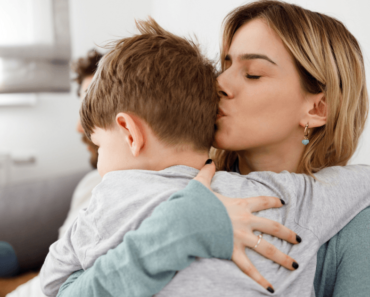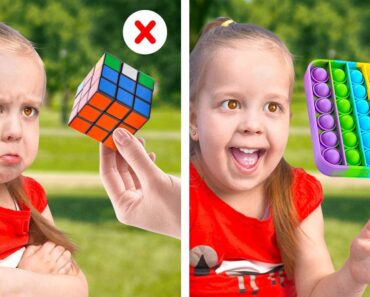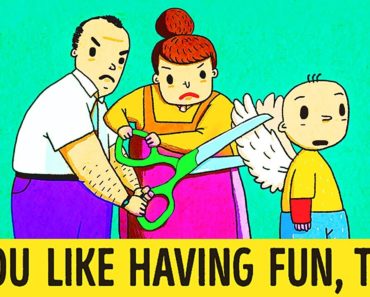Rhonda Michels, a mom in Canmore, Alta., was watching her two kids play in the backyard on a spring afternoon when her daughter Lexi, 3, started pulling leaves off the small birch saplings.
“I told her no, and she just went and did it again,” Michels says. “She just kept doing it and doing it, while looking at me. I had no idea how to deal with this as a parent: I can’t take away the tree.”
In that frustrating moment, Michels wasn’t sure if her daughter’s defiance was just normal toddler boundary testing or something she definitely needed to punish her for. Why wasn’t her daughter listening to her firm and clearly communicated rules? She’d told her not to do it multiple times.
As babies grow into toddlers and begin to assert their independence—usually around 18 to 24 months—it becomes clear that parents need to establish guidelines and boundaries for what kind of behaviour is and isn’t OK. But figuring out how to discipline a toddler isn’t always obvious. Just winging it every time isn’t going to teach your kids consistency, and many of the techniques you remember from your own childhood just aren’t effective at this young age. Do you give your two-year-old a time out? Or a “time-in” where you connect, cuddle and talk it through instead? What if a judgy fellow parent sees your calm reaction and assumes the kids must really rule the roost?
The reading list of discipline books and number of experts you’ll see online can be overwhelming. There’s Janet Lansbury’s No Bad Kids: Toddler Discipline Without Shame, which explains a discipline approach that’s rooted in respecting your child. (She also has a popular podcast.) You may have also seen books, parenting accounts and sites referring to RIE parenting, which stands for Resources for Infant Educarers (it’s also known as Respectful Parenting). The classic How to Talk So Kids Will Listen and Listen So Kids Will Talk, by Adele Faber and Elaine Mazlish, is a staple on Montessori-inspired parent reading lists. What about Thomas W. Phelan’s time-out-based 1-2-3 Magic?
No matter which resource you follow, all the experts are in agreement that cultivating the relationship between you and your child is more important than the discipline approach you choose.
“The most important thing with children is that they want to feel heard,” says Toronto therapist and clinical social worker Anita Owusu. “Teach them that they do have something to say. They’re not always going to get their way, but you will listen to them.”
Owusu says parents can help themselves stay calm in the face of a toddler’s big reaction by reframing discipline as a way of teaching, instead of making it about punishing. Parents may want to raise their voice and punish a child for misbehaving, but firmly teaching a child what the boundaries are while maintaining
a connection with them is more likely to be successful long-term.
Another important reminder: Try not to take your toddler’s behaviour personally.
“Toddlers do not wake up in the morning with the intention of making their parents’ day miserable,” says Lisa Milligan, a child therapist at Strides Toronto, a non-profit agency that provides a variety of mental health and developmental support services to children, youth and families. Developmentally, toddlers are moving from being totally dependent on their parents or caregivers to asserting some independence—while also trying to master new skills. When little kids respond to something with a big emotion or behaviour that contradicts what they’ve been asked to do, they’re actually looking to their parents or caregivers to help them handle their feelings with empathy and understanding, Milligan says.
We asked the experts how parents can handle some of the most common high-friction situations with toddlers while still maintaining a connection—and hopefully not losing it themselves.
What to do when your toddler refuses to leave the park or a playdate
Judy Iliev, a mom of two in Athens, Georgia, tries to be as proactive a parent as possible. She plans ahead and will talk through the day’s schedule with her sons in advance to prevent surprises and keep a consistent routine. But sometimes transitioning from something fun is still difficult for them.
At a recent playdate with their quarantine-bubble buddies, Iliev did what she usually does when it’s almost time to go. She gave her kids several countdown-to-departure warnings, and she even had her three-year-old help set the timer on her phone.
“The timer went off, and everybody melted down,” Iliev says. After offering her sons one last chance to spin BeyBlades, she stood up, took her three-year-old by the hand, and calmly walked him and her older son to the car, both boys in tears.
“It’s mentally exhausting to not scream and yell,” Iliev says. But losing her patience and shouting doesn’t help either. “I know that because I’ve done it, and it didn’t change the situation.”
Julia Johnson, a child and family therapist in Newmarket, Ont., says planning in advance for moments you know are going to be tricky for your child to manage is key.
“If you talk to them before, it’s easier for them to know what’s going to happen and to make the transition,” she says.
Discussing the situation and the schedule before it happens can also include talking about the consequences: What will happen if they don’t come when it’s time to leave? A logical consequence for a toddler could be as simple as picking them up and putting them in the car when it’s time to go, Johnson says.
Vancouver-based parenting author and child psychologist Vanessa Lapointe says it’s important to remember that little kids have no sense of time, so giving warnings in more concrete terms (such as “three more times down the slide” instead of “five more minutes”) can help children understand them.
But even when parents communicate the plan well, many kids still resist leaving an activity, like playing at the park or with friends. Transitions are simply difficult for toddlers, even if it’s the opposite scenario, like leaving the house to go somewhere fun.
Empathy is the way to go, not chastising or announcing a consequence, Lapointe says. Parents should enforce their boundaries firmly but kindly.
What to do when your kid won’t get in their stroller
Dahlia Khimji’s* two-year-old son has made it very clear that he would prefer not to sit in the stroller. He’d rather walk or be carried, and he’s interested in the stroller only when he wants to play with the buckles. “He holds his body stiff. He bucks and screams,” the Toronto mom says.
During the COVID-19 lockdown, they were never in a hurry, so she has opted to give up on the wheels and take him for meandering walks at toddler speed instead.
Lapointe agrees that parents should try to pick their battles. If it’s not essential for a child to go in a stroller, consider letting them walk or ride a scooter, depending on their preference. But if being in the stroller is necessary for time constraints or safety reasons, parents should hold firm to the boundary and explain to the child what is going to happen. Warn them in advance that they will need to stop what they’re doing and get into the stroller soon. Then follow through, pick them up and buckle them in, even if they’re screaming and thrashing.
Even if you have somewhere you need to be, parents should try to stay calm in the moment, Lapointe says. Acknowledge to your toddler that you know transitions are hard for them, too.
“The good thing with two-year-olds and three-year-olds is, you’re still a lot bigger than they are, so as much as the flailing little body is hard to manage at times, you are still able to do that,” Lapointe says.
Johnson says planning for the stroller can include giving your child a snack or their favourite book or toy—it’s not quite bribery, but offer them something that will make the stroller a more pleasant place for them to be.
How to handle your toddler hitting another child
The first time Janice Anderson saw her two-year-old son, Aaron, run over and hit his older sister without provocation, she picked him up and put him in a two-minute time out.
Anderson, a mom in Calgary, tends to use the discipline methods from 1-2-3 Magic with her two children. Phelan’s book recommends parents count to three to give their children a chance to stop any problematic behaviour. If they haven’t stopped by the time you get to three, they’re headed for a time out.
But when Aaron hit his sister, Anderson didn’t count to three—she whisked him away to his bedroom immediately. “With hitting, you need to actually stop the behaviour right away,” she says.
Milligan agrees that parents need to intervene swiftly when a toddler hits. Using a calm voice, simply tell the child to stop by saying something like “hands down” or “hands aren’t for hitting,” Milligan says. You can also take the child’s hand and put it down by their side.
But instead of punishing a toddler for expressing themselves with their hands, think about “planting the seeds of problem solving” by offering little ones words they can use to express their frustration, Milligan says. “Teach them to say things like ‘I don’t like it when I can’t play with you’ or ‘I get mad when you do that.’”
Hitting, spanking or physically disciplining a child who has just hit someone, even if it’s just a tap on the wrist, is never a wise idea, as it gives the opposite message to what the parent intends.
“I’m telling you it’s not OK to hit your sibling, but now I’m hitting you? That’s not a very good learning experience,” Milligan says.
She cautions that introducing time outs as a punishment for children younger than three isn’t advisable. Toddlers aren’t yet able to make the same cause-and-effect connections an older child can, so they aren’t likely to understand that if they hit, they’ll get a time out or lose a privilege, like screen time.
If a child needs some space to calm themselves down, a break from the situation can be helpful, but not necessarily if it’s delivered in a punitive way, as with a time out.
“We don’t want to leave young children on their own to manage their emotions,” she says. You may also find that a two- or three-year-old won’t, voluntarily, stay put in a time out, and it will just become another (losing) battle with few lessons learned.
What to do when your toddler won’t get dressed
Ahmeda Mansaray-Richardson’s two-year-old son, Judah, spends a lot of time wearing only underwear.
“I pick my battles,” says Mansaray-Richardson, a mom of five sons and the founder of Toronto home-schooling and children’s workshop space Sage and Savant. “Barefoot, naked, I don’t care. It’s less laundry for me if he doesn’t get dressed, and then I don’t have to go around chasing shoes that he will inevitably kick off.”
When the family is going somewhere where pants are necessary, she delegates dressing her two youngest sons (ages two and five) to two of their older brothers, who are nine and 10. The younger boys are happy to follow their big brothers’ outfit recommendations.
Planning ahead and empowering little kids by giving them age-appropriate choices can also help minimize some of the battles over getting dressed, Owusu says. “Parents can say something like, ‘These are the two outfits, and you can pick one or the other.’”
Some parents might have success by helping their child pick out the next day’s clothes the night before, Johnson adds. “Usually, with the kids who are having a hard time getting dressed in the morning or leaving the park, they have trouble with transitions and changes, so the more you plan with them, the better.”
And when the prospect of getting dressed or putting on shoes leads to a big emotional outburst, it’s worth pressing pause so you can help your child calm their body down, even if you’re running late, Johnson says. (This could also be considered a “time-in.”)
Lapointe phrases it this way: “Collect their tears with compassion, and move along.”
It isn’t easy to keep your cool in the face of a volatile toddler’s loud defiance, especially if you’re dealing with other stressors in your life at the same time. When it comes to disciplining a toddler, allow yourself to feel frustrated at the situation—it is maddening. Then, while you’re giving your kid a few extra minutes to adjust to the idea of leaving the house, for example, take a couple of deep breaths for yourself, too. It’ll help you cope—at least until the next time.
* Names have been changed
Editor’s note:
We hope you enjoyed reading this article from Today’s Parent. We’re working hard to provide our readers with daily digital articles that aim to inform, inspire and entertain you.
But content is not free. It’s built on the hard work and dedication of writers, editors and production staff. Can we ask for your support? We are currently offering 3 issues of the print edition of Today’s Parent for only $5. A subscription also makes a great gift for that new parent in your life.
Our magazine has endured for more than 35 years by investing in important parenting stories. If you can, please make a contribution to our continued future and subscribe here.
Thank you.
Kim Shiffman
Editor-in-Chief, Today’s Parent

































